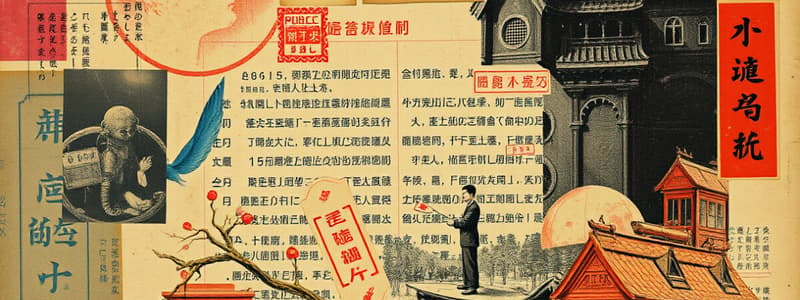Podcast
Questions and Answers
What does 'Lend' mean in Chinese?
What does 'Lend' mean in Chinese?
- 借口 (jie kou)
- 卖 (mai)
- 送 (song)
- 借 (jie) (correct)
Children can be alone at the picnic area without an adult.
Children can be alone at the picnic area without an adult.
False (B)
What is the Chinese term for 'museum'?
What is the Chinese term for 'museum'?
博物馆 (bo wu guan)
To stay healthy, one must __________ regularly.
To stay healthy, one must __________ regularly.
Match the following phrases with their meanings:
Match the following phrases with their meanings:
What is the Chinese term for 'school project'?
What is the Chinese term for 'school project'?
Children must be accompanied by an adult in the picnic area.
Children must be accompanied by an adult in the picnic area.
What does 'explain' mean in Chinese?
What does 'explain' mean in Chinese?
To stay fit, one must __________ regularly.
To stay fit, one must __________ regularly.
Match the following English phrases with their Chinese translations:
Match the following English phrases with their Chinese translations:
Flashcards are hidden until you start studying
Study Notes
Vocabulary and Phrases
- Lend/Borrow: The process of allowing someone to use something temporarily or taking something from someone with the intention to return it.
- School Project: A collaborative assignment or task completed by a group, known in Chinese as 小组作业 (xiao zu zuo ye).
- Picnic Area: Designated space for outdoor eating and recreation, referred to as 野餐的地方 (ye can de di fang).
- Museum: A place where artifacts, art, and history are preserved and displayed, called 博物馆 (bo wu guan).
Important Guidelines
- Children's Supervision: It is mandatory for children to be accompanied by an adult, expressed as 小朋友必须家长陪伴 (xiao peng you bi xu jia zhang pei ban).
- Walking: The term for traveling on foot is 步行,走 (bu xing, zou).
- Explanation: The act of clarifying or making something understandable is known as 解释 (jie shi).
- Time Efficiency: Activities that do not require much time can be described as 不花时间=快 (bu hua shi jian = kuai).
Additional Information
- Computer Screen: Refers to the display device of a computer, identified as 电脑屏幕 (dian nao ping mu).
- Arrival Time: It is advised to reach a destination no later than a specified time, represented as 不要晚过(这个时间)(bu yao wan guo zhe ge shi jian).
- Using Stairs: The action of opting for stairs instead of an elevator is noted as 走楼梯 (zou lou ti).
- Fitness: The term for maintaining physical health is 保持健壮 (bao chi jian zhuang).
- Party Organization: The act of planning and hosting a celebration or gathering is described as 举办派对 (ju ban pai dui).
- Stability in Change: Indicating something that has not altered is captured with 没变=同样的 (mei bian = tong yang de).
- Cost: The term for something that requires a lot of money is 贵 (gui).
Vocabulary and Phrases
- Lend/Borrow: The process of allowing someone to use something temporarily or taking something from someone with the intention to return it.
- School Project: A collaborative assignment or task completed by a group, known in Chinese as 小组作业 (xiao zu zuo ye).
- Picnic Area: Designated space for outdoor eating and recreation, referred to as 野餐的地方 (ye can de di fang).
- Museum: A place where artifacts, art, and history are preserved and displayed, called 博物馆 (bo wu guan).
Important Guidelines
- Children's Supervision: It is mandatory for children to be accompanied by an adult, expressed as 小朋友必须家长陪伴 (xiao peng you bi xu jia zhang pei ban).
- Walking: The term for traveling on foot is 步行,走 (bu xing, zou).
- Explanation: The act of clarifying or making something understandable is known as 解释 (jie shi).
- Time Efficiency: Activities that do not require much time can be described as 不花时间=快 (bu hua shi jian = kuai).
Additional Information
- Computer Screen: Refers to the display device of a computer, identified as 电脑屏幕 (dian nao ping mu).
- Arrival Time: It is advised to reach a destination no later than a specified time, represented as 不要晚过(这个时间)(bu yao wan guo zhe ge shi jian).
- Using Stairs: The action of opting for stairs instead of an elevator is noted as 走楼梯 (zou lou ti).
- Fitness: The term for maintaining physical health is 保持健壮 (bao chi jian zhuang).
- Party Organization: The act of planning and hosting a celebration or gathering is described as 举办派对 (ju ban pai dui).
- Stability in Change: Indicating something that has not altered is captured with 没变=同样的 (mei bian = tong yang de).
- Cost: The term for something that requires a lot of money is 贵 (gui).
Studying That Suits You
Use AI to generate personalized quizzes and flashcards to suit your learning preferences.




